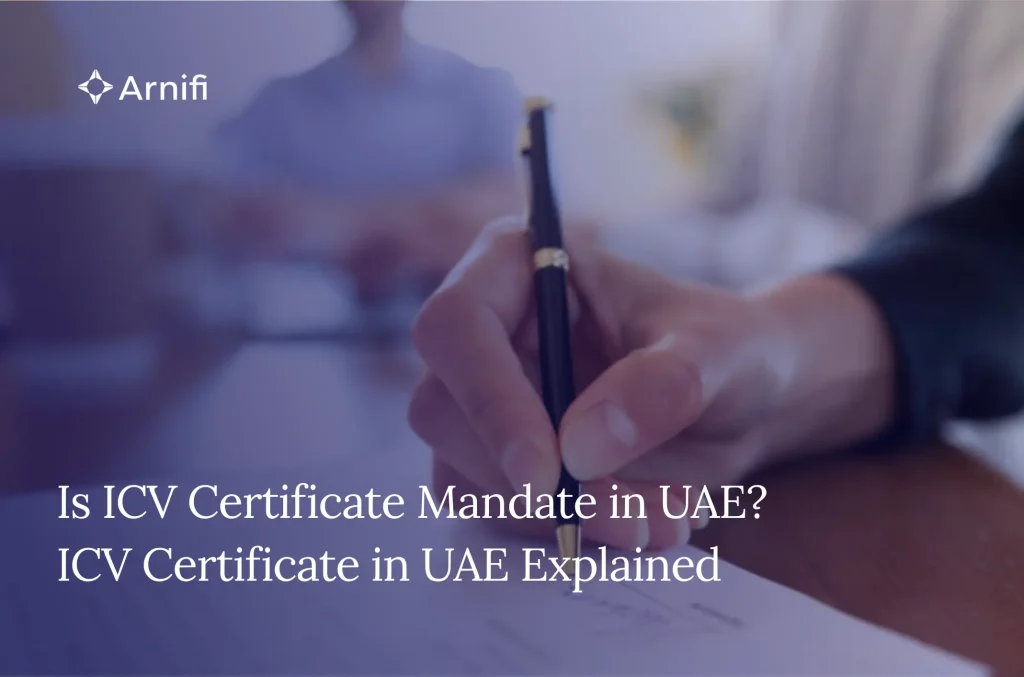Is ICV Certificate Mandate in UAE? ICV Certificate in UAE Explained
by Shethana Nov 19, 2025  7 MIN READ
7 MIN READ

ICV is a procurement program that rewards local spend, hiring, and investment. It signals supplier strength to government buyers and large groups that score tenders on In-Country Value.
Table of contents
- What is ICV Certificate in UAE and How Does It Work?
- Who Requires an ICV Certificate?
- What Helps Gaining the Score in an ICV Certificate?
- What is Eligibility and Timelines for an ICV Certificate?
- What Certifiers Review in ICV Certificate?
- ICV Certificate Application Process in UAE
- Frequent Issues With ICV Certificate and How To Prevent Them
- What is the Renewal Process of an ICV Certificate?
- ICV Certificate Support from Arnifi
- FAQs
So, is ICV certificate mandate in UAE? The answer is no! No. An In-Country Value (ICV) certificate is not a universal federal requirement for all companies. However, it is a key prerequisite in many government and semi-government tenders and a strong competitive edge in the broader market.
For suppliers selling into those channels, ICV becomes functionally mandatory. Certification relies on audited financials to convert a balance sheet and P&L into one ICV score. It is an evidence-backed credential that can lift bids when price and technical offers are close.
What is ICV Certificate in UAE and How Does It Work?
ICV is a standardized document that reports a supplier’s calculated In-Country Value score for a defined financial year. The score reflects how much of the supplier’s activity is retained in the UAE economy through local purchases, salaries, capital investment, and other factors.
Procurement teams use the score to rank offers with similar price and technical quality, or to screen new vendors. Therefore, an ICV certificate in UAE functions like a compliance and competitiveness marker at once.
It is issued by authorized certifying bodies that review audited accounts and supporting schedules, then apply the official formula to compute the score. Certificates are linked to the supplier’s legal entity and are valid for a period tied to the date of the audited financial statements.
Who Requires an ICV Certificate?
For distributors, service providers, manufacturers, EPC firms, and subcontractors that sell into the following, ICV certification influences tender outcomes.
Also, for firms focused on retail or purely export models, ICV is optional yet still useful as part of a wider corporate narrative on local contribution.
- Federal and emirate-level ministries and authorities that adopted the unified ICV framework.
- Energy sector buyers and their tiered contractor networks.
- Industrial and infrastructure project owners with localization goals.
- Large private groups that align sourcing policies with national programs.
What Helps Gaining the Score in an ICV Certificate?
While exact weighting can depend on multiple facts like official circulars, consistent building blocks remain:
- Local procurement and subcontracting. Spend on UAE-based suppliers and manufacturers, supported by invoices and TRNs.
- Employment and Emiratisation. Headcount and payroll to UAE nationals and residents, evidenced by payroll records and statutory filings.
- Capital investment within the UAE. Plants, machinery, R&D facilities, and long-term assets, supported by fixed-asset registers.
- Exports and revenue mix. Sales outside the country can influence the score depending on sector templates.
- Net value retained. A neutralization of imported content to ensure the score reflects domestic retention.
Because the score derives from audited numbers, accounting and bookkeeping becomes the most important to get a better score. Clear ledgers, mapped cost centers, and supplier classifications prevent disputes during certification.
What is Eligibility and Timelines for an ICV Certificate?
Who can apply?
Any legal entity with audited financial statements for the latest financial year. Groups with several entities apply per entity; consolidation rules apply only where officially permitted.
Financial statement requirements
Internationally accepted standards are expected, signed by licensed auditors. If a new entity lacks a full-year audit, shorter-period statements may be accepted under specific provisions; this typically reduces validity.
Validity period
Certificates are generally valid for a fixed number of months tied to the audit report date. Once a new audit is available, the prior certificate lapses, and buyers ask for the updated score.
Processing time
Standard cases are complete in a few weeks, provided the evidence is complete and reconciled. Clarifications extend timelines, especially where supplier classification or asset schedules are inconsistent.
What Certifiers Review in ICV Certificate?
Organized folders, consistent naming, and reconciled totals save significant time. Most delays occur when general ledger numbers do not match the template sections, or when supplier residency status is not documented.
- Trade license, and specimen signatures of authorized signatories.
- Latest audited financial statements and detailed trial balance.
- Fixed-asset register with location, commissioning dates, and depreciation method.
- Payroll data, visa status summaries, and Emiratisation records.
- Purchases and subcontracting lists with supplier TRNs and country tags.
- Export documents and shipping proofs where relevant.
- Leases, tenancy contracts, and utility bills that support local footprint.
- Prior certificate, if any, for variance analysis.
ICV Certificate Application Process in UAE
For teams understanding how to get ICV certificate in UAE, these steps will help audited accounts gain an accepted score:
- Choose an authorized certifying body. Select based on sector familiarity and capacity to review within target timelines.
- Confirm financial year and scope. Align to the latest audited period and declare entity boundaries.
- Prepare the template. Fill official worksheets with numbers that tie back to the audited trial balance.
- Assemble evidence. Attach schedules, registers, and third-party proofs that link to each figure.
- Submit for review. Expect Q&A on supplier residency, asset location, and payroll specifics.
- Resolve clarifications. Provide reconciliations or revised schedules where mismatches appear.
- Receive certificate and score. Check legal names, license details, and validity dates before sharing with buyers.
Frequent Issues With ICV Certificate and How To Prevent Them
- Unclear supplier residency. Missing TRNs, PO boxes, or licenses block classification. Maintain an approved vendor list with verified residency proofs.
- Mixed ledgers. Capital items recorded as expenses or vice versa distort the investment component. Lock account mapping and review additions monthly.
- Payroll mismatches. HR records and accounting totals must match. Reconcile payroll journals to bank payments and statutory filings.
- Late audits. An expired audit delays certification and disrupts tender calendars. Agree audit timelines well ahead of renewal.
- One-off “fixes.” Cosmetic period-end entries that try to boost local content without an operational basis are flagged in reconciliations and may be rejected.
What is the Renewal Process of an ICV Certificate?
Treat certification like an annual compliance cycle, not a last-minute tender requirement. The right method removes panic during large bid windows and ensures the next audit translates quickly to a renewed certificate.
- Quarterly health checks. Review procurement mix, asset additions, and staffing against target ratios.
- Policy alignment. Update sourcing and HR policies to support localization without inflating cost.
- Internal controls. Include ICV evidence in monthly close packs so schedules are ready by audit time.
- Stakeholder communication. Share the current score and planned improvements with business development, proposal teams, and major customers.
ICV Certificate Support from Arnifi
Arnifi can help you with a-to-z ICV certificate requirements including audit-tie templates, supplier residency mapping, fixed-asset and payroll schedules, and certifier liaison.
Teams align procurement and HR data to the official model, track quarterly progress, and manage renewals so certificates remain valid during tender peaks. The outcome is a credible score, clean documentation, and faster acceptance by major buyers.
Hire the best accounting and bookkeeping services in UAE from ARnifi to ensure clean ICV certification for the business.
FAQs
1) Is ICV only for energy projects?
No. The unified framework now spans multiple sectors and authorities. Energy remains a major adopter, but certification appears in infrastructure, industrial, and public-sector tenders as well.
2) Can a startup with partial-year accounts apply?
Yes, subject to official provisions. Certificates based on shorter periods often carry reduced validity. Full-year audits lead to smoother acceptance.
3) Does outsourcing manufacturing to a UAE contract maker help the score?
Local manufacturing partners can strengthen the procurement component when invoices and residency proofs are in order. Contract terms should make flows auditable.
4) How are group companies handled?
Each legal entity generally certifies separately. Some buyers allow consolidated offers but still request entity-level certificates for verification.
5) When should renewal start?
Initiate once the next audited financials are available. Early preparation avoids gaps in vendor registration portals and active tenders.
Top UAE Packages

Related Articles
Top UAE Packages



